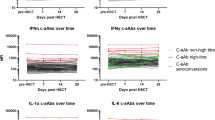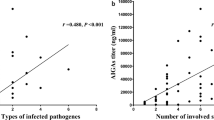Abstract
IL-10 plays an important role in the control of immune reactions during systemic infection. Here, IL-10 serum levels were investigated in patients after BMT. The IL-10 levels correlated with the clinical course of the patients and with serum levels of C-reactive protein (CRP) and neopterin (NP). A total of 26 patients with AML (7), ALL (12), CML (2), NHL (3) and multifocal Ewing’s sarcoma (2) had received autologous (10) or allogeneic (16) BMT from related (9) or unrelated donors (7). Routine serum samples were obtained prior to BMT and at days 46 and 100 after BMT. However, in patients with severe complications additional samples were drawn at individual points in time. Prior to BMT, IL-10 serum levels were not detectable in 24/24 patients. Post-BMT, 11 patients developed elevated IL-10 levels, of these eight died of complications (DOC), whereas only one of 15 patients with undetectable IL-10 died of complications, indicating that high IL-10 levels were significantly correlated with severe life-threatening complications (χ2, P < 0.01). to determine the pathomechanism and role of the increased il-10 levels, they were correlated to the respective np and crp serum concentrations. crp and np concentrations were found significantly elevated in patients with detectable il-10, indicating a severe acute phase reaction associated with macrophage activation. in conclusion, high il-10 serum levels in patients after bmt were significantly associated with fatal outcome. since il-10 is a strong suppressor of t cell immunity, high il-10 production in patients with severe complications such as septic shock or gvhd >grade II after BMT might lead to functional immunodeficiency contributing to the poor prognosis of these patients.
This is a preview of subscription content, access via your institution
Access options
Subscribe to this journal
Receive 12 print issues and online access
$259.00 per year
only $21.58 per issue
Buy this article
- Purchase on Springer Link
- Instant access to full article PDF
Prices may be subject to local taxes which are calculated during checkout
Similar content being viewed by others
Author information
Authors and Affiliations
Rights and permissions
About this article
Cite this article
Hempel, L., Körholz, D., Nußbaum, P. et al. High interleukin-10 serum levels are associated with fatal outcome in patients after bone marrow transplantation. Bone Marrow Transplant 20, 365–368 (1997). https://doi.org/10.1038/sj.bmt.1700902
Received:
Accepted:
Issue Date:
DOI: https://doi.org/10.1038/sj.bmt.1700902
Keywords
This article is cited by
-
A case of post-transplant adult T-cell leukemia/lymphoma presenting myelopathy similar to but distinct from human T-cell leukemia virus type I (HTLV- I)-associated myelopathy
SpringerPlus (2014)
-
IL-10 promoter polymorphism associated with decreased risk of aGvHD after stem cell transplantation: a meta-analysis
International Journal of Hematology (2013)
-
Investigation of Functional IL-10 Gene Polymorphism and IL-10 Levels in Acute Graft-Versus-Host Disease
Journal of Clinical Immunology (2010)
-
Kinetics of plasma cytokines after hematopoietic stem cell transplantation from unrelated donors: the ratio of plasma IL-10/sTNFR level as a potential prognostic marker in severe acute graft-versus-host disease
Bone Marrow Transplantation (2001)
-
The kinetics of circulating cytokines including IL-6, TNF-α, IL-8 and IL-10 following allogeneic hematopoietic stem cell transplantation
Bone Marrow Transplantation (2001)



